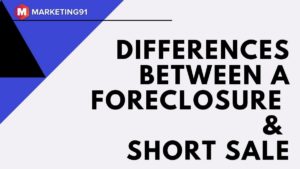
When a person has taken a loan from a bank or financial institute and fails to pay the mortgage on time left with two options, one is a foreclosure, and the other is a short sale.
In foreclosure, the lenders take the possession of the property and, in the process of a short sale, the borrower gets permission from the lender to sell the property. In foreclosure, the property of the borrower is sold vis property agents or is sold at auction.
Foreclosure impacts the credit score of the borrower badly. On the other hand, short sales put a less negative impact on the credit score of the borrower.
In this article, you will learn about both foreclosure and short sales and the key difference between both of them.
What if Foreclosure?

A foreclosure is a legal process in which lender seizes the property of a borrower who stops paying payments. The borrower uses the property he bought as collateral to take a loan from the lender. The property is used as “Security Interest” by the lender when he agrees to give a loan to the borrower.
However, the borrower has the legal right to redeem his property by repaying the debt. The right is granted to the borrower by the courts of equity. Because of this law, a lender can neither use the property freely, nor he can resell it.
Therefore, a lender would always want to terminate the “equitable right of redemption as soon as he gets the property through the process of foreclosure. A lender must have both legal and equitable title of the property to be able to use it freely.
The process is carried out by the legal court. Court provides a final date to the borrower. The borrower has to pay back the pending amount along with the foreclosure expenses in case he wants to redeem his property.
The money received by the lender is first taken by the lender to fulfill his loan amount, and the rest amount is given to the homeowner (borrower) and in case if the property is not able to bring back the mortgage given by the lender, then the borrower is liable to pay back the remaining amount.
What is a Short sale?

A short sale is when a homeowner is permitted by the lender to sell his property at a lesser price than the mortgage amount. The process of a short sale is initiated by the property owner when he is not financially stable, or the price of his property has reduced substantially.
The objective of a short sale is to recover as much as the amount that can be recovered from the short sale. The short sale of the property is similar to the regular sale of the property, but the lender of the loan is also involved in the process of a short sale.
The process of a short sale is initiated by the borrower to get a release from the debt. However, most of the time, the amount recovered by the short sale of the property is not enough to pay back the whole loan amount.
Many former borrowers get surprised when they receive a bank notice to pay back the remaining amount. This outcome is called “deficiency judgment.” The situation of “deficiency judgment” can take place after both foreclosure and short sale.
The homeowners must take legal advice before selling the property through a short sale and make sure that whether the property will be able to pay back the whole loan amount taken.
A short sale is a complicated process, and it requires a lot of paperwork and approval of multiple authorities. Therefore, most people prefer the foreclosure process at the place of a short sale.
The key differences between a foreclosure and short sale
| Foreclosure | Short sale |
|---|---|
| A foreclosure is a process where the property of a borrower is seized by the lender in case of failure in the payment of the mortgage. | A short sale is a process where borrower sells his property at a lesser price than the remaining balance of the mortgage. |
| The property is sold at auction. | The property is sold through a realtor. |
| The property is sold by the lender. | The property is sold by the owner of the home. |
| The credit score of the borrower is reduced by 200-400 points. | The impact on credit score is comparatively less. The score is reduced by 50-150 points. |
| The foreclosure is initiated by the lender. | Short sale is initiated by the homeowner. |
| The Foreclosure will be reported on the future loan applications. | The short sale may or may not be reported on the future loan applications applied by the borrower |
| The person can purchase a new property after 5 years but with few restrictions and after 7 years with no restriction. | The person can purchase property right after the short sales. |
Conclusion
Both foreclosure and short sale are the processes to recover the mortgage amount. The foreclosure is a process which is forced on the borrower by the financial entity, and the short sale is a process that a borrower initiates to pay back the loan amount.
Both processes have their advantages and disadvantages. One should take legal advice before considering any of these options. However, a short sale is a better option than the foreclosure that one should consider.
The post Difference Between Foreclosure and Short Sale appeared first on Marketing91